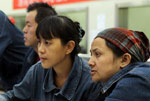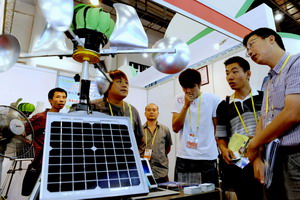Nation urged to diversify forex investment
Updated: 2011-09-16 07:46
By Lan Lan (China Daily)
|
|||||||||||
DALIAN, Liaoning - China needs to diversify its huge foreign exchange (forex) reserves by promoting overseas investment in the real economy such as infrastructure, economists and officials said.
Zhu Min, deputy managing director of the International Monetary Fund, said that ensuring safety and liquidity are top priorities in the management of forex reserves.
"The Chinese government is trying to diversify its forex reserves and take measures to slow their growth. That would be beneficial to the economic stability of the world as well as China," he said on the sidelines of the World Economic Forum on Thursday.
China's forex reserves hit $3.2 trillion at the end of June. The downgrade of the US government credit rating sparked worries that the value of China's US dollar assets would decrease. It is estimated that 70 percent of China's forex reserves are dollar assets.
Zhang Xiaoqiang, vice-minister of the National Development and Reform Commission, said China is trying to use its forex reserves more effectively, including raising the effectiveness of overseas investment.
For instance, China has further facilitated foreign exchange purchasing for enterprises that intend to go overseas, he said.
"China should gradually divert its investment from US debts to real economies," said Li Daokui, a professor of finance at Tsinghua University and an academic member of the central bank's monetary policy committee.
Wang Boming, editor-in-chief of Caijing magazine, said maintaining the value of China's forex assets is a key issue amid the economic woes in Europe and the US.
He suggested investing some of the reserves in the US infrastructure construction industry instead of buying debts.
The return on that investment would be low and take a long time, but it would be better than the lower yields of US debts, he said.
"The US government lacks money, and private investors are not enthusiastic about investing in such projects, so it could be an opportunity," he said.
Meanwhile, China might encounter its first annual trade deficit in years in 2012 if the global economic situation continues to worsen, Wang said.
Investment will remain the driving force of China's economic growth, due to the bleak trade outlook and slow increase in consumption, he said.
Asian emerging economies, including China, still face high inflation risks, and that will be a long-term problem, so it's important to maintain tight monetary policies, Zhu said.
The People's Bank of China, the central bank, has raised the benchmark interest rate three times this year and lifted the reserve requirement ratio six times to contain inflation.
China is a key contributor to global economic recovery and faces calls to bail out the troubled European economies.
China is willing to buy euro bonds, however, within its capacity, Zhang said.
It's important for all countries to participate in negotiating and finding solutions to the problem of the European economy, but a real solution is more than bond buying, Zhu said. "Liquidity is only a part of the issue. Another important part is for European economies to carry out structural reforms."
China Daily
(China Daily 09/16/2011 page18)













